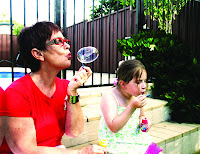This month is Childlife Awareness Month. Childlife or Hospital Play has existed in hospitals that care for children since early in the 20th century often starting out as volunteer programs. However in Australia up until the second half of the 20th century and even now in the 21st century play programs are not always available in hospitals that care for children. Play gives children and adolescents the opportunity to express some of their apprehensions arising from the stress of illness. It also provides ‘normal’ everyday activities as a diversion from health care issues.
AWCH recognised the importance of play in hospital from its very early days and held a residential seminar at Armidale on play in hospital in 1976. A first in Australia, it brought together a wide range of hospital staff, teachers and students in various disciplines and others interested in both the theoretical and practical aspects of play in hospital. It was through this seminar that play workers from a variety of hospitals and institutions and in widely differing positions became aware of each other’s existence and made recommendations for unified guidelines to be established as to their status in the hospital system. Today the Australian Association of Hospital Play Specialists promotes the importance of developmental play activities, therapeutic play, play preparation programs, medical play, diversion and distraction activities, and pre-
admission programs. In April 2013, AAHPS is holding its 7th biennial international conference, Connect and Collaborate A Hospital Wide Approach to Psychosocial Care in Melbourne.
So currently, where are we at with hospital play services in Australia? The AWCH 2005 National Survey Report on the Psychosocial Care of Children and Their Families in Hospital reported on the state of hospital play in Australia. The report found that just under 25% of surveyed hospitals had play or recreation staff and just over half provided a separate play room in or near the ward for child patients. Just a note here that these were all hospitals who provided care for children and young people. Of concern is the fact that just under 15% of those surveyed did not provide any separate play space for child patients.
AWCH made several recommendations:
- Hospitals admitting paediatric patients should allocate a suitable space for play and recreation activities
- Hospitals providing care for paediatric patients should employ appropriately qualified staff to conduct play activities, preparation for specific medical tests and procedures, medical play and distraction
- Hospitals providing care for paediatric patients should allocate appropriate play space, as recommended by the American Academy of Pediatrics
- In areas where children are required to wait, suitably qualified play staff and/or suitable play or recreation space should be available to provide developmental, medical and preparation activities
So…are we doing any better in 2013? Does every hospital that cares for children and young people have play and recreation services available? What is the state of ‘play’ at your local hospital?
Anne Cutler
Program Manager AWCH




